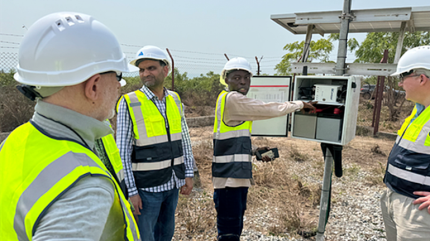
An International Atomic Energy Agency (IAEA) Site & External Events Design Review Service (SEED) team has concluded an eight-day safety review of Ghana’s site selection process for its first NPP. The mission reviewed Ghana’s adherence to IAEA guidance on site selection. This first SEED mission to Ghana was requested by the Government and hosted by Nuclear Power Ghana (NPG), under the purview of the Ministry of Energy and Green Transition.
Ghana has successfully completed the site selection process and identified the candidate site and an alternative site for its first NPP. The next stage following site selection is the characterisation stage of the site evaluation process.
The team comprised four experts from Pakistan, Türkiye, the UK and the US, as well as one IAEA staff member. They reviewed the site selection report, together with the siting process, siting criteria, data collection process and application of the management system for siting activities.
The team also visited and observed the candidate site in the Western Region and the alternative site in the Central Region. In addition, IAEA organised a SEED Capacity Building Workshop to support site evaluation. During the workshop, external experts and participants engaged in discussions that will contribute to future progress in the site evaluation process.
“We confirmed that both the implementing organisation and the management system are well-designed with the support of the government and that the Site Approval Report has been systematically and thoroughly prepared. Ghana followed the IAEA safety standards while performing the site selection process,” said mission team leader Kazuyuki Nagasawa, Senior Nuclear Safety Officer at the IAEA.
The team provided recommendations to improve the quality and optimise the site selection process. This optimisation seeks to minimise the possibility of the site being found to be unsuitable during the site characterisation stage. The factors for consideration include the susceptibility to earthquakes, flooding and extreme weather events, as well as the feasibility of the emergency plan.
As a good practice, the team noted that within NPG, leadership and management for safety have been functioning well since the beginning of the siting process.
“We acknowledge with deep appreciation the IAEA SEED mission’s technical assistance in assessing our site selection” said Stephen Yamoah, Executive Director of NPG. “This mission is of great importance to our nuclear power programme, as it ensures that our decisions are guided by international best practices for safe and secure development of nuclear power infrastructure. The relevance of the mission extends beyond technical assessment, reinforcing our commitment to transparency, regulatory preparedness and sustainable nuclear energy development.”
NPG will continue to receive ongoing technical assistance from IAEA, while advancing the site approval process in accordance with the IAEA Specific Safety Guide on Site Survey and Site Selection for Nuclear Installations. The final SEED mission report will be delivered to the Government of Ghana within three months.






